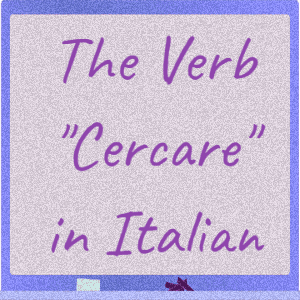The Italian verb “cercare” is one of those essential words you’ll encounter and use in many conversations in Italian. Whether you’re on a quest for directions in Italy, trying to explain your search for information, or simply looking for your keys at home, “cercare” will be your go-to verb. Translated as “to search,“ “to look for,“ “to seek,“ or “to try,“ this versatile verb is used in a wide variety of contexts. In this guide, we’ll walk you through everything you need to know to use “cercare” like a native speaker, from its conjugation to common expressions and practical tips.
What Does the Verb “Cercare” Mean in Italian?
At its core, “cercare” simply means “to look for” or “to seek.” It’s the verb you’ll use when actively searching for something—whether it’s a physical object, a piece of information, or even an abstract goal. Here’s a closer look at its meaning:
1. Cercare = To Look For / To Search For
The most common meaning of “cercare” is “to look for” or “to search for.“ It refers to actively seeking something, whether it’s a physical object, a piece of information, a location, or even a goal. It can also refer to looking for work, a new opportunity, or a job position.
Here are some examples:
| Sto cercando le chiavi. | I’m looking for the keys. |
| Cerca il libro sulla scrivania. | Look for the book on the desk. |
| Sto cercando un lavoro. | I’m looking for a job. |
| Cerca una nuova opportunità. | Look for a new opportunity. |
| Sto cercando un ristorante. | I’m looking for a restaurant. |
| Cercavo una casa in campagna. | I was looking for a house in the countryside. |
| Cerca su Google. | Search on Google. |
| Ho cercato nel dizionario. | I searched in the dictionary. |
2. Cercare = To Seek
In a more formal or philosophical context, “cercare” can mean “to seek,“ often implying a deeper or more abstract search, such as seeking truth, happiness, challenge, experience, or understanding.
Here are some examples:
| Cerca la verità. | Seek the truth. |
| Lui cerca sempre nuove sfide. | He always seeks new challenges. |
| Tutti cercano la felicità. | Everyone seeks happiness. |
3. Cercare = To Try / To Attempt
When used in expressions like “cercare di,” “cercare” can mean “to try” or “to attempt.“ It implies an effort to do something, even if the outcome is uncertain.
Here are some examples:
| Cerca di raggiungere i tuoi sogni. | Try to reach your dreams. |
| Sto cercando di imparare l’italiano. | I’m trying to learn Italian. |
| Cerca di arrivare in tempo. | Try to arrive on time. |
Conjugation of the Verb “Cercare” in Italian
Since “cercare” is a regular -are verb, it follows the typical conjugation patterns of Italian verbs ending in -are. Here’s how you’ll conjugate “cercare” in the most common tenses:
Present Tense
Use the present tense of “cercare” to describe actions happening now or regularly. Here’s the breakdown:
| Io cerco | I look for |
| Tu cerchi | You look for (informal) |
| Lui/Lei cerca | He/She looks for |
| Noi cerchiamo | We look for |
| Voi cercate | You (all) look for |
| Loro cercano | They look for |
Past Tense (Passato Prossimo)
To talk about actions that have already happened, you’ll use the passato prossimo. For this, “cercare” uses the auxiliary verb “avere” and the past participle “cercare.” Here’s how to conjugate it:
| Io ho cercato | I looked for |
| Tu hai cercato | You looked for (informal) |
| Lui/Lei ha cercato | He/She looked for |
| Noi abbiamo cercato | We looked for |
| Voi avete cercato | You (all) looked for |
| Loro hanno cercato | They looked for |
Future Tense
When you’re talking about looking for something in the future, you’ll use the future tense:
| Io cercherò | I will look for |
| Tu cercherai | You will look for (informal) |
| Lui/Lei cercherà | He/She will looks for |
| Noi cercheremo | We will look for |
| Voi cercherete | You (all) will look for |
| Loro cercheranno | They will look for |
How to Use the Verb “Cercare” in Italian?
Using the Verb “Cercare” in Different Contexts in Italian
One of the things that makes “cercare” so useful is that it can be applied in a variety of situations. Let’s look at some common contexts in which you’ll use this verb.
1. Looking for Objects
When you’re searching for a physical item, “cercare” is the verb you’ll want to use. Whether you’ve misplaced your keys or you’re hunting for your favorite book, “cercare” comes in handy, for example:
| Hai visto dove ho messo il cellulare? Sto cercando il mio cellulare. | Have you seen where I put my phone? I’m looking for my phone. |
2. Seeking Information
You can also use “cercare” when you’re looking for information—whether online, in books, or by asking around. It’s the verb for when you’re trying to find an answer to a question, for example:
| Sto cercando informazioni su Roma. | I’m looking for information on Rome. |
| Abbiamo cercato una soluzione, ma non l’abbiamo trovata. | We searched for a solution, but we didn’t find it. |
3. Searching for People or Places
If you’re looking for a person or a location, “cercare” is also the appropriate verb. You’ll use it in situations ranging from looking for a friend in a crowd to finding a new restaurant, for example:
| Sto cercando il mio amico Fabio. | I’m looking for my friend Fabio. |
| Stiamo cercando un albergo vicino alla stazione. | We’re looking for a hotel near the station. |
4. Attempting to do something
The Italian verb “cercare” can mean “to try” or “to attempt” when followed by the preposition “di.” It implies an effort to do something regardless of the outcome, for example:
| Cercavo di spiegare la situazione, ma nessuno mi ascoltava. | I was trying to explain the situation, but no one was listening. |
| Hai cercato di risolvere il problema da solo? | Did you try to solve the problem by yourself? |
Common Expressions with the Verb “Cercare” in Italian
One of the best ways to master any verb is by learning the common phrases and expressions it appears in. Here are some everyday Italian expressions with “cercare” that will help you sound more natural:
- Cercare guai – To look for trouble
| Non cercare guai! | Don’t look for trouble! |
- Cercare di fare qualcosa – To try to do something
| Sto cercando di imparare l’italiano! | I’m trying to learn Italian! |
- Cercare un lavoro – To look for a job
| Sto cercando un lavoro migliore. | I’m looking for a better job. |
- Cercare la felicità – To seek happiness
| Tutti cercano la felicità. | Everyone seeks happiness. |
Reflexive Use of the Verb “Cercare” in Italian
In some cases, you’ll see “cercare” used reflexively, where the action of seeking is directed toward oneself. This is more common in idiomatic expressions or when someone is looking for something for their own benefit. Here are some examples:
| Mi cerco sempre un po’ di tempo per rilassarmi. | I always look for a little time to relax. |
| Ti cerchi un posto tranquillo per studiare. | You find yourself a quiet place to study. |
Mistakes to Avoid with the Verb “Cercare” in Italian
While “cercare” is a regular verb and generally straightforward, there are a couple of common mistakes to keep in mind:
1. Confusing “cercare” with “trovare” (to find)
“Cercare” means “to search,” while “trovare” means “to find.” Don’t mix them up! For example, don’t say “Ho cercato il mio cellulare” when you actually mean “I found my phone” — use “Ho trovato il mio cellulare.”
2. Using the wrong auxiliary verb in the passato prossimo
Remember that “cercare” uses “avere” (not “essere”) in compound tenses. For example, “Ho cercato” (I looked for), not “Sono cercato.”
Final Thoughts: Mastering “Cercare” in Italian
With its wide range of uses, “cercare” is a crucial verb to add to your Italian vocabulary. Whether you’re looking for a specific object, seeking information, or searching for answers to a question, you’ll find yourself using this verb very often. By practicing its conjugation, common phrases, and reflexive forms, you’ll sound more natural and confident when speaking Italian. So, start incorporating “cercare” into your daily conversations, and you’ll be on your way to mastering this essential verb!



